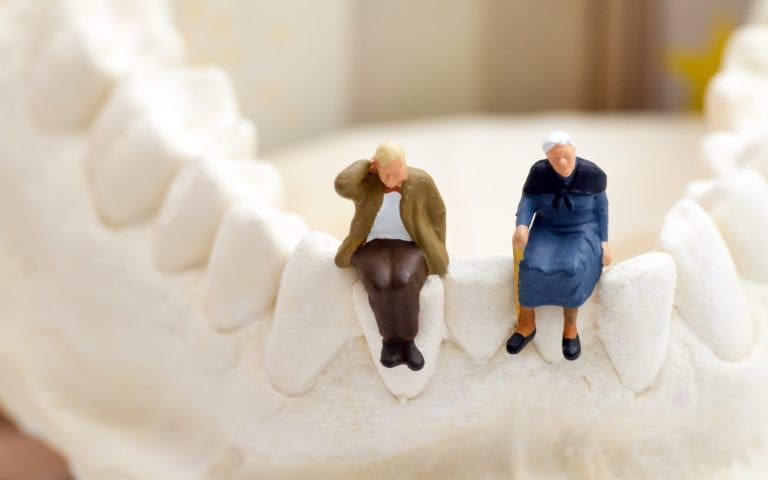
The Alzheimer’s – Oral Health Connection
What is Alzheimer’s Disease
According to the CDC: ‘Centre for disease control and prevention,’ Alzheimer’s disease is the most common form of dementia, a diminishment in one’s cognitive abilities. Alzheimer’s is a progressive disease that starts with memory loss and can advance to the point of not being able to carry on conversations or interact with the environment around you.
The connection between your oral health and your overall health can’t be overstated. Taking care of your teeth can help serious medical conditions such as heart disease and diabetes. But more and more research are showing that your oral health can be a factor for neurological conditions – particularly Alzheimer’s disease. Alzheimer’s affects over fifty million people worldwide and is 6th major cause of death. There is no cure for Alzheimer’s or clear prevention strategies, medical research has identified many risk factors for Alzheimer’s and other types of dementia. Here’s how poor oral health habits can increase your risk of developing Alzheimer’s later in life.
The cause is currently unknown, but factors such as age and genetics can play important roles in your chances of developing Alzheimer’s disease. Age is the biggest risk factor, with symptoms usually becoming apparent around the age of 60.
What is Gum Disease?
Gum disease is the result of poor oral hygiene habits. It is caused by plaque building up and not being removed properly by brushing and flossing at home. Doing so may protect you from serious long-term dental problems, as well.
Plaque on your teeth is caused by starch and sugar from the food you eat combined with the naturally-occurring bacteria in your mouth. It’s invisible, sticky and grows quickly even after brushing and flossing. Plaque’s ability to grow quickly is why proper brushing and flossing are so important. Doing so helps protect your teeth from problems like gingivitis and periodontitis.
The Connection Between Gum Disease and Alzheimer’s
Gum disease (gingivitis) and periodontal disease (periodontitis) have been connected to Alzheimer’s through the‘Porphyromonas Gingavalis’ species of bacteria. This bacterium commonly presents itself in gum and periodontal disease and has been shown to move from the mouth to the brain. It releases enzymes that destroy nerve cells and can lead to Alzheimer’s disease. This means gum disease and periodontal disease can increase your risk factor for Alzheimer’s, particularly if you go untreated.
What You Can Do to Prevent It
With this information, one of the best ways to reduce your risk for Alzheimer’s is to take care of your oral health. Reducing plaque build-up and keeping your gums healthy is key for keeping ‘Porphyromonas Gingavalis’ from getting into your bloodstream. If you have or suspect you have gum disease, seek out treatment from a dentist immediately. Apart from that, the two biggest things you can do to keep your mouth plaque free are:
1. Hygiene
Your daily oral hygiene routine is your first line of defense against plaque build-up. Brushing twice a day and flossing once a day is the best way to keep your mouth clean. For more information on how can you maintain a good oral hygiene, call ‘Smile Delhi – The Dental Clinic’ at 9811106377.
2. Preventive Care
Hygiene isn’t the only component to your oral health routine. Preventive care, particularly your regular cleanings and exams, is an important part of maintaining your oral health and reducing plaque build-up in your mouth. There are four steps involves in cleaning that includes: ultra-sonic cleaning, cleaning with hand instruments, flossing and polishing. Make sure you consult with the best dentist in Delhi, regularly and get the preventive treatment that is right for your mouth!
Gum disease may not be a direct cause of Alzheimer’s, but it is a risk factor you can easily mitigate with good oral hygiene and regular preventive care. Also taking care of your oral health is a key part of taking care of your overall health.
How You Can Maintain Oral Hygiene
Maintaining good oral health doesn’t guarantee that you’ll never develop Alzheimer’s disease, nor does poor oral health guarantee that you’ll develop Alzheimer’s. However, maintaining basic oral hygiene can help give you peace of mind knowing that you’re doing everything you can to protect your oral and overall health.
To prevent yourself from gum disease and possibly Alzheimer’s disease, make sure that you’re:
- Brushing for two minutes, twice per day
- Flossing at least one per day after eating
- Rinsing with an ADA-approved mouthwash
- Seeing your dentist every six months for cleanings and check-ups
Gum disease is an easily preventable condition. It can also be treated when caught early in the form of gingivitis. Failure to take care of your teeth can have serious consequences even if it never develops into Alzheimer’s disease. When left untreated, gingivitis can progress into periodontitis, which can result in tooth loss.
It’s estimated that around 80% of adults have some form of gum disease. Here at ‘Smile Delhi – The Dental Clinic’, we’re able to treat gum disease before it can create havoc in your body.
Caring for an Alzheimer’s Patient’s Oral Health
Patients that have Alzheimer’s disease typically experience worsening oral health as their condition progresses. In the earlier stages of the disease, patients can often continue their daily routines — including brushing their teeth and going to the best dentist near you.
As their condition worsens and their cognitive function decreases, Alzheimer’s patients forget these routines that they may have had their entire life. This can have detrimental effects on their oral health and overall wellbeing.
Prevention is vital when it comes to caring for a patient with Alzheimer’s. If you or someone you love has dementia or Alzheimer’s, here is some information that could help:
- Help brush their teeth at least twice a day.
- Demonstrate how to brush properly.
- Try different toothbrushes to see which works best.
- Find the right dentist to care for their needs.
- Stay aware of any discomfort or pain in the mouth.
- Properly sanitize dentures.
- Keep a record of recent dental appointments.
To book an appointment with us in, ‘Smile Delhi – The Dental Clinic’– call us on +91-9811106871 or whatsapp Dr. Suprriya B Bhatia on +91-9811106377. You can also mail us on [email protected]
“We Care To Make You Smile”
Posted by: Dr Hema


































































